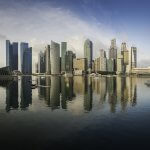By Singapore Management University
Melissa Mithra is in a senior role at a top financial institution in one of the most sought-after functions in her sector: risk management.
For most of the last decade, she has advanced her career via building up her technical skills. While this has served her well, she recently decided that she could achieve even more. “I wanted to acquire new holistic skills that could help me understand global business management practices and become a better leader. More importantly, I wanted to see opportunity at every corner,” says Melissa, who’s been head of risk management at Zurich Insurance in Singapore since 2014.
Melissa looked around for a world-class business school that would deliver these skills within an Asian context, taking advantage of the region’s growth potential. She also wanted a programme offering a practical style of learning, which allows executives to apply their knowledge in the real world.
Her eventual choice was the Executive MBA (EMBA) from Singapore Management University (SMU). The 12-month part-time programme is designed to prepare executives for the challenges of working in leading organisations in rapidly growing Asian and global markets. It emphasises globalising Asian businesses and ‘Asianising’ international businesses. “The course is holistic as we examine Western case studies as well as Asian ones. It’s a uniquely international approach,” says Melissa.
SMU EMBA’s global credentials are further enhanced by study stints at three other world-class universities: The Wharton School in Philadelphia (USA), the Indian School of Business in Hyderabad (India), and the Guanghua School of Management in Beijing (China). These week-long visits immerse students in the business, political, social and legal issues facing the three countries.
“The trips were one of my favourite aspects of the programme. We were taught by leading professors from each business school, so we extracted genuinely local and diverse perspectives,” says Melissa. “There was a different focus to each stint. In China, it was about agile and disruptive strategies, while at Wharton we studied corporate strategy—including the successes and failures of leading institutions.”
“The professors brought a good blend of real-world industry experience and academic knowledge into the classroom,” says Melissa. “They encouraged interaction—we did a lot of case studies and there was plenty of robust discussion, which added value to the entire experience.”
But Melissa didn’t spend her whole time in the classroom. “We visited a leading e-commerce firm in China, a shipyard in the US and a hospital in India, and got the chance to interact with their management to learn how they run their operations. We also walked the floor chatting to staff—it was an open environment and excellent platform to learn new business perspectives in diverse environments.”
The diversity and seniority of Melissa’s 2017 class “helped make the learning environment more vibrant and collaborative”, she says. Her fellow students come from 15 nationalities (including Spain, South Korea, Israel and India) and 16 industries, including finance, manufacturing and healthcare. The average SMU EMBA student has 19 years of experience. “I’m surrounded by leaders from different industries, so I’m getting new perspectives on management and decision making,” she adds.
Melissa says she looked forward to her classroom discussions. “The dialogue I had with my classmates were very valuable because the challenges we face in our jobs are surprisingly similar, and I get to leverage upon solutions that have worked for them in order to accelerate my experience.”
Since embarking on this programme, Melissa says she’s enjoyed learning at SMU’s centrally located campus and thinks the EMBA curriculum, which is co-designed by more than 100 business leaders across Asia, is “innovative and well structured”.
Topics covered in Singapore include corporate finance, strategic marketing management, negotiation and conflict resolution, innovation and growth management, corporate social responsibility, and leading in a global environment. “The new skills I’ve acquired with the EMBA include strategy and marketing,” says Melissa. “Before, both topics were an art to me; now I’ve learnt the science behind them. Because of my new knowledge of strategy and marketing frameworks, I now understand our customers a lot better and am better positioned to formulate business strategies to serve our customers.”
Melissa says the SMU EMBA programme has also improved her soft skills, in particular leadership and negotiation. “There’s an interesting leadership module, which focuses on how to strike a good balance in your leadership style in a global environment. Also, my negotiation skills, which are very important in my role, have improved as well.”
Students don’t have to wait until they complete the programme to experience its benefits on the job, says Melissa, who graduated in May this year. “The knowledge acquired provided me with the platform to engage more effectively with colleagues from other departments.”
Melissa concludes, “Embarking on the EMBA has been one of the best decisions I’ve made in my career and I would strongly encourage executives to explore on this transformational journey to maximise their full potential. “It’s challenging but definitely worth it. I encourage you to make the investment.”
This article was originally published on eFinancialCareers.








